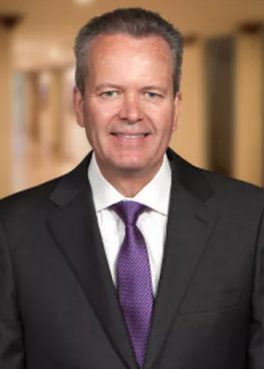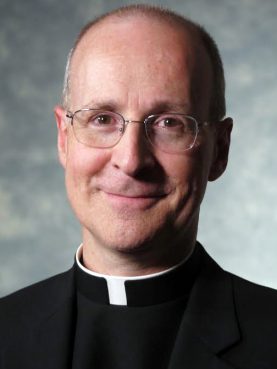Business

VATICAN CITY (RNS) — In a high-rise apartment in New York City overlooking the Freedom Tower and the Statue of Liberty, Catholic thought leaders both conservative and liberal gathered to pray together and share a fine meal over a glass of Cabernet Francis — all in an effort to overcome polarization.
In the Catholic world, it’s hard to imagine an unlikelier pair than Tim Busch and the Rev. Jim Martin. A successful businessman and entrepreneur, Busch founded the Napa Institute in 2011 to combat secularization in the church and uphold conservative values. Martin, the editor-at-large of the Jesuit magazine “America” is best known for his Outreach program, aimed at promoting inclusivity and welcome for LGBTQ+ members of the Catholic community.
Together, these two representatives of opposing factions in the church have created a framework for dialogue, even friendship, among priests, activists and journalists who would otherwise be arguing over divisive theological issues on social media.
Busch contacted Martin and asked for his help to bring left leaning Catholics to the table and today the two speak regularly to work on common issues and think of ways to bring their dinner experiment to U.S. parishes. The dinners started in late 2023, as Busch became increasingly concerned with rising political polarization in the U.S. and the deepening fractures he saw mirrored in the Catholic church.

Tim Busch. (Photo courtesy Catholic University)
Of course, in the minds of many liberal Catholics, Busch is partly responsible for those fractures, having hosted gatherings at the Napa Institute where some of the most vocal conservative Catholic voices in the U.S. railed against woke-ism and liberal ideologies.
By this year’s annual summer gathering of the Napa Institute, held July 24-28 at the Meritage Resort and Spa in Napa, California, Busch had struck a new tone, urging Catholics during his keynote speech to leave the culture wars behind and to “stop hating and start loving.”
Busch has hosted four dinners, with 40 guests so far, and plans to host three more this year. “We are not there to debate or have a theological conversation, although it’s not prohibited, it’s just not the primary goal,” Busch told Religion News Service in an interview on Monday (July 29).
“After all, we all share the same beliefs on 95% of the issues,” he added.
The meetings start with a short Mass in the chapel in Busch’s apartment, followed by reciting the rosary before a Marian shrine that his daughter made. After a brief reception, guests are invited to sit for dinner. It was Martin’s idea to ask participants in turn to share their favorite Bible verse and describe how it has impacted their lives.
“That allows them to talk about their spiritual life, but also the family, the kids, the priests, the conversions. It’s really touching,” he said. “There are so many people who break down crying during the event. I think it shows the impact of meeting people that they have never met before, but they know who they are, and every day they get up in the morning and fight them instead of fighting the devil. I think that’s a big relief.”
There are 12 guests for every dinner, with Busch and his wife attending every one. “It was very Eucharistic,” the Rev. Ricky Manalo, a member of the Paulist Fathers, who attended one of the dinners in March, told RNS.
“Any type of gathering that centers around food is always a good start to conversation and common ground,” he said.
A French chef prepares a Mediterranean-inspired dinner for the guests, and Busch, who is in the wine business, pulls out copious amounts of wine — averaging one bottle per guest — from his Trinitas Cellars. “It dials everybody down,” he said.
Many of the wines are named after Marian shrines, but the one titled after Pope Francis is the real conversation starter, Busch said. “Especially for left/center people, they think, “Oh, this guy doesn’t hate the pope — he makes wine with the pope’s name on it!” he said, adding that he sends cases of the wine to the pope as well.
Busch said he tries to invite six people from both camps, conservative and liberal. Every guest receives a bio of the other participants before the dinner so “nobody gets surprised,” he explained. No one has canceled last minute, and overall people who attended said they were glad to have come, Busch said.
Conservative guests have included the editor of “First Things” magazine, Russell Ronald Reno, and Catholic commentator and author Sohrab Ahmari, and Father Javier del Castillo, the U.S. vicar of the Prelature of Opus Dei.
The list of progressive Catholic guests who have attended the dinners includes professors from Fordham University but also influential Catholics such as Kerry Robinson, who heads Catholic Charities U.S.A., and Sam Sawyer, the editor in chief of “America Magazine.” Inviting left-leaning Catholics to dinner would have been impossible for Busch without Martin’s support, he said.

The Rev. James Martin. (Photo courtesy Nutopia)
“I’ve suggested a number of names to Mr. Busch, and when my friends receive their invitations they almost always write to me and say, ‘Should I go?’ And I say yes,” Martin said in an email to RNS. “Afterwards they write to tell me how grateful they were to have gone.”
The bestselling author of “Building a Bridge: How the Catholic Church and the LGBT Community Can Enter into a Relationship of Respect, Compassion, and Sensitivity,” Martin has faced considerable vitriol from conservative faithful on social media and traditional news outlets. At Pope Francis’ request he was also invited to bring his perspective to the Synod on Synodality, born from a three year consultation of Catholics at every level to discuss major issues and challenges facing the church, which will have its second and last summit in October at the Vatican. The synod adopts Jesuit-inspired methods to promote thoughtful and respectful dialogue in the church.
“The Synod has invited us to be a church that listens to the voice of the Holy Spirit, and how can we listen to the Spirit if we don’t first listen to one another?” Martin said.
After posting an article by Busch describing the dinners and their goal to lower tensions in the church, Martin received many comments on X criticizing him for “siding with the devil,” and some stopped following him on social media. “I think the more important feedback was from the participants, all of whom seem to have found it valuable,” Martin said.
These kinds of efforts are part of being a synodal, that is, listening, church. For in order to hear the voice of the Spirit we first have to listen to one another.
— James Martin, SJ (@JamesMartinSJ) July 23, 2024
RELATED: Vatican reports financial gains as it prepares for new profit strategy
The issue of polarization in the church has reached soaring heights, especially in the United States. Pope Francis directly addressed conservative opposition in the U.S. during an interview with CBS in April, where he described his detractors as being engaged in a “suicidal attitude” by being “closed up inside a dogmatic box.”
Francis has also recently taken action against his strongest critics, revoking the pension and Vatican lodgings of the leading voice of U.S. conservatives, Cardinal Leo Burke, and dismissing fiery papal critic Bishop Joseph Strickland from his diocese in Tyler, Texas. In early July, the Vatican also excommunicated former U.S. papal envoy Archbishop Carlo Maria Viganò for the crime of schism, after the prelate claimed Francis was not the rightful pope.
A 2023 Pew Research Center poll found that Catholics are extremely polarized in the U.S., with 44% Democrat or leaning Democrat and 52% Republican or leaning Republican. Moreover, in April, Pew found that partisan affiliation strongly impacts Catholic views of Pope Francis — with 89% of U.S. Catholics who are Democrats or lean Democrat having a favorable view of the pope, compared to only 63% percent of Catholics who are Republican or lean Republican. It’s the most politically polarized view of Pope Francis since Pew began surveying on him.

“Large partisan divide in U.S. Catholics’ opinions of Pope Francis” (Graphic courtesy Pew Research Center)
The U.S. Conference of Catholic Bishops (USCCB) has attempted to address this issue through the “Civilize It” initiative, which includes asking faithful to promise to respect the dignity of every human being, including those who think differently.
“When you’re writing the Tweet, imagine Jesus is there with you and when you think through that, question ‘should I do this?’” said Bishop McElroy of the Diocese of San Diego during a panel discussion as part of the initiative.
The Paulist Fathers, a Catholic religious society, organized a summit on polarization in April where they invited hundreds of Catholic leaders, communicators and thinkers to discuss how to promote dialogue and reconciliation within the church.
“Polarization is a first-order crisis,” said Manalo, who was among the organizers of the San Diego event. “We can’t talk about anything, about gun control, abortion, gender or ecology, in our country or in our church unless we learn to talk to one another.”
Manalo believes religious leaders have been caught up in the cultural upheavals of the past 50 years, which have created a “perfect storm” where tribalism has dominated the public discourse. When he attended the Napa gathering this summer, he walked up to Busch to suggest further steps and initiatives to ensure the dinners don’t become a one-off event.
Busch said that even the “archconservative and traditional” members of the Napa board and guild fully support the dinners and that he plans to continue hosting them. The calendar for 2024 is full, and dinners are already being planned for 2025. Busch is particularly interested in getting prelates together, including Cardinal Wilton Gregory of Washington.
“We just need to figure out how to become more effective and intentional about bringing the church together so it’s not just a one-night phenomenon,” he said.
RELATED: Dementia, disability and the 2024 presidential election
“This is another smart constituent!”
“VATICAN CITY (RNS) — The unlikely duo of conservative businessman and Jesuit priest hope to bridge the divide in the church. The post Tim Busch and Jim Martin bring left…”
Source Link: https://religionnews.com/2024/08/02/liberal-and-conservative-catholics-try-to-overcome-polarization-with-dinner-and-wine/
#Business – BLOGGER – Business